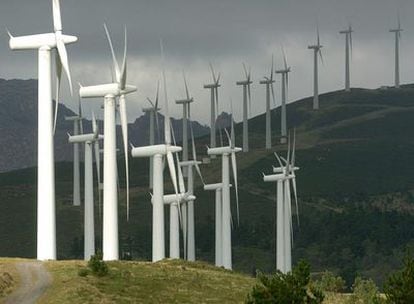Spain rejects Brussels’ plan to classify nuclear power and natural gas as green energy
Madrid says doing so would send the wrong signals to the financial markets as Europe works to achieve net-zero greenhouse gas emissions by 2050
/cloudfront-eu-central-1.images.arcpublishing.com/prisa/URZKQ4IGGDCRKINRMBD5MKADIE.jpg)
Spain is rejecting the European Commission’s proposal to classify nuclear energy and natural gas-powered plants as green technology.
In a statement released on Saturday, the Commission said it had begun consulting with EU member states on a text that will later be sent to the European Parliament and Council for scrutiny. The document is part of the EU Taxonomy, a rule book to channel investment toward activities meant to help achieve net-zero greenhouse gas emissions over the next three decades.
But the Spanish government, led by a center-left coalition of the Socialist Party (PSOE) and Unidas Podemos, has already made it clear that it objects to the new definition of green investment.
“Natural gas and nuclear [power] cannot be considered green or sustainable technologies in the Taxonomy regulations, regardless of the possibility of making continued investments in both,” said a source at Spain’s Ministry for the Ecological Transition. This position was later confirmed by a ministry statement. “It makes no sense and it sends the wrong signals for the energy transition of the whole of the EU,” said Minister Teresa Ribera in the statement.
Instead, the ministry noted, Spain defends putting nuclear energy and natural gas plants in “a yellow, intermediate category due to their role in the transition, but without being considered green.”
Nuclear energy does not produce greenhouse gas emissions, but managing radioactive waste poses unique problems. And combined-cycle plants powered by natural gas have much lower carbon dioxide (CO₂) emissions than coal plants, but they still run on a fossil fuel.
In the 60-page legal draft that Brussels has sent to member states, and to which EL PAÍS has had access, new and existing nuclear plants that meet certain conditions would be considered sustainable investments until 2045. Combined-cycle plants running on natural gas would be in the same category until 2030. Both types of energy are included in the EU Taxonomy’s second category, reserved for power sources with low carbon emissions and no available alternative for the moment.
“Including both in the green taxonomy represents an erroneous signal for the financial markets and does not provide the necessary clarity to focus capital flows towards the decarbonized, resilient and sustainable economy foreseen in the European Green Deal,” said the Spanish ministry’s statement.

Labor Minister Yolanda Díaz also reacted negatively to the draft document. “Europe still has the opportunity to reconsider this decision and avoid distancing itself from the scientific evidence and social demand,” she said in a Twitter message.
In Europe, the biggest defender of viewing nuclear power as green energy is France, where two-thirds of consumed electricity comes from such plants. The bloc’s other major player, Germany, supports this definition for natural gas, which it is using to replace old coal plants.
But with the Greens (who oppose both nuclear power and natural gas) as the second force in Germany’s new coalition government, it is unclear whether the country’s position will remain the same. Vice-Chancellor Robert Habeck on Saturday said that labeling nuclear energy as sustainable is “a mistake.”
In Spain, renewable sources contributed around 47% to the total energy mix in 2021. Wind was the top energy source overall, followed by nuclear power, combined-cycle plants, hydro, solar, co-generation and coal.
/cloudfront-eu-central-1.images.arcpublishing.com/prisa/7TMGVGTYPQIUGFSJLNDPDKZFCA.jpg)
/cloudfront-eu-central-1.images.arcpublishing.com/prisa/3PAZLWRJTSGZFVROMK2M2YE3UY.jpg)










































